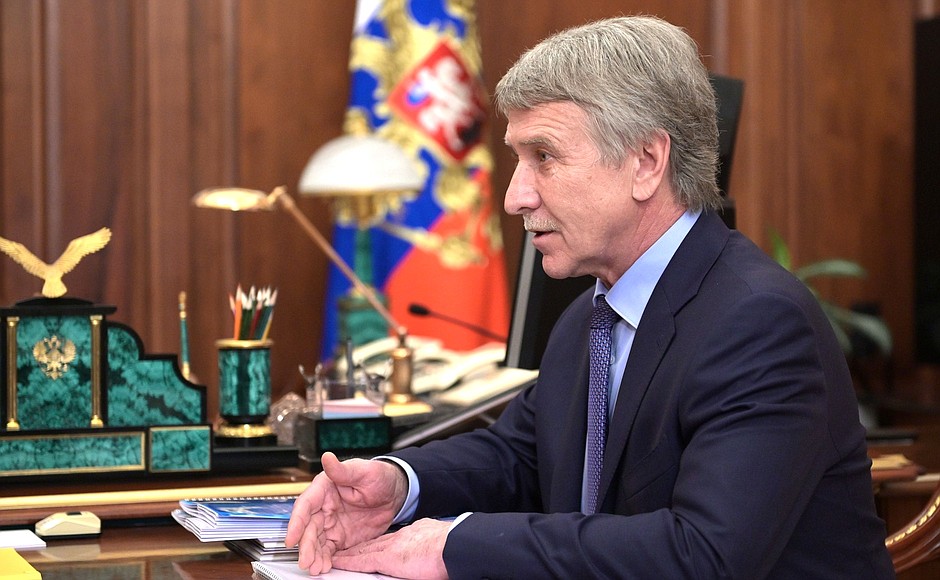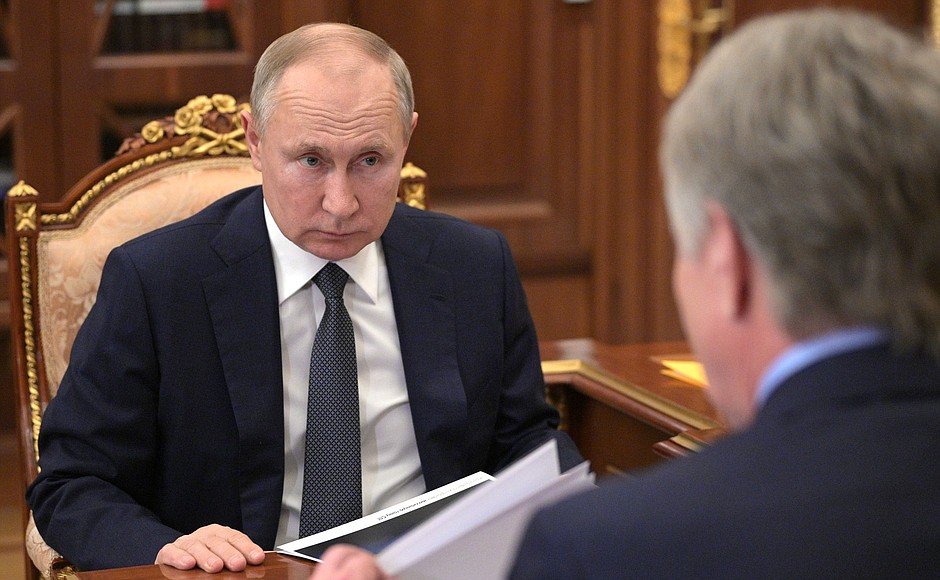President of Russia Vladimir Putin: Mr Mikhelson, it is clear from these papers that the company’s capitalisation is approaching 4.5 trillion rubles.
NOVATEK CEO Leonid Mikhelson: At one point it exceeded this sum, but has slumped a bit.
Mr President, I would like to brief you on our performance last year, on the implementation of the Arctic LNG 2 project and the creation of the Offshore Superfacility Construction Yard (OSCY), which we are doing in accordance with your Executive Order.
Vladimir Putin: All of this is very important.
Leonid Mikhelson: I will try to be as brief as possible.
Vladimir Putin: Good.
Leonid Mikhelson: Last year, despite COVID-19, we completed several facilities.
Our oil production is decreasing, while the production of gas condensate is growing rapidly, thanks to the Achimov deposits. Our reserve replacement rate has reached 117 percent.
Vladimir Putin: What is the reason for this?
Leonid Mikhelson: We have increased the scope of exploration work five or six times over. We used to invest 2 or 3 billion rubles, while the current figure is over 10 billion.
Our flagship project, Yamal LNG, is developing consistently and has already exceeded design capacity by 14 percent. Last year, we produced 50 million tonnes of LNG in the period after the launch of the project. We account for 5 percent of global LNG production.
Vladimir Putin: I congratulate you on this achievement.
Leonid Mikhelson: Yes, this is a very good result indeed.
Vladimir Putin: I see this as your personal achievement.
Leonid Mikhelson: Last year and in January and February of this year we made unique voyages.
Vladimir Putin: Along the Northern Sea Route?
Leonid Mikhelson: Yes. Navigation began in May, and in January and February we completed what I would describe as unique voyages together with Sovcomflot and Rosatom.
This is yet another step, possibly even two more steps towards year-round use of the Northern Sea Route. We are very much in need of this, and we are discussing with Rosatom, or more precisely with Rosatomflot, the possibility of launching year-round navigation in 2023/2024.
Vladimir Putin: Everything is proceeding according to plan in terms of icebreakers.
Leonid Mikhelson: Yes, one more icebreaker is to be ready late this year.
Vladimir Putin: What about the storage facility in the Far East?
Leonid Mikhelson: I would like to say a huge thank you to the Government. Everything we needed was included in the plan. All the matters concerning the Gulf of Ob and Kamchatka have been resolved.
In late 2022 and early 2023, the transit terminals on Kamchatka and in Murmansk will become operational. The first terminal will have a capacity of 10 million tonnes. About twenty billion came from the federal budget and Novatek added more than 60 billion.
Vladimir Putin: Did you work things out with the Defence Ministry sites? Is this matter resolved?
Leonid Mikhelson: Yes, we moved our facilities 100 km away.
Vladimir Putin: Is everything fine?
Leonid Mikhelson: Everything is fine, of course.
Vladimir Putin: Did you get approvals?
Leonid Mikhelson: By all means.
We also launched a small-capacity LNG plant in Magnitogorsk (40,000 tonnes) and plan to fully equip the motorway connecting St Petersburg and Chelyabinsk with our LNG stations, including the southbound direction. I believe it is also very important. We are building petrol stations. Among others, there are now ten LNG stations in Germany and stations in Poland.
Vladimir Putin: Very good, this is an excellent contribution to developing green energy.
Leonid Mikhelson: Yes. We are about to reach 2,000 tonnes per month for our LNG stations abroad. This is significant.
Vladimir Putin: This is great, considering the plans to decarbonise the European economy.
Leonid Mikhelson: Yes, we now have a carbon neutral station in Germany.
Vladimir Putin: Super. Will Russia have the same kind of stations?
Leonid Mikhelson: Even better. We are building multi-source stations, supplying both LHG and LNG. Some stations even offer compressed gas, depending on the engine. This is a huge cooperation project, thanks to Kamaz, on shifting engines. The Ministry of Industry and Trade is involved, too.
Vladimir Putin: The more stations there are, the more engines there will be.
Leonid Mikhelson: Of course.
I believe that, when it comes to the results of 2020, despite COVID-19 and three very difficult months, we did not fall behind schedule with our Arctic LNG 2 project. If possible, please review this presentation, Mr President. We are working on this project with our foreign partners from France, China and Japan.
Our initial plan was that the first line would be launched in 2023 and the second in 2024. Since we have two docks, I will speak about that later, the third line was to be launched in 2026. I think, as it is today, the lines will be launched in 2023, 2024 and 2025, respectively. This is 19.8 million tonnes.
Now, here is a unique technology, a full-cycle liquefaction train. Its dimensions are 330 metres by 150 and 90 metres in height. It weighs 670,000 tonnes.
Vladimir Putin: What about the technology?
Leonid Mikhelson: We bought the technology from Linde, Germany. The first technology, for Yamal LNG, was APCI. This one is by Linde. We bought many of these licences. No issues here.
Most importantly, I also wanted to tell you that the main cryogenic facility on the third line will be built in Russia by Severstal and Linde. I will tell you about its localisation.
Vladimir Putin: (switching to the next slide): Is this the shipbuilding facility?
Leonid Mikhelson: This is the centre responsible for the full-cycle platform construction. It comprises everything: from pipe material and metal workshops, assembly workshops and two docks to concrete plants and fixture workshops. I brought you this album with the latest photographs. The dimensions of the biggest workshop are 220 m by 280 m and 94 m high.
Vladimir Putin: There are four concrete plants.
Leonid Mikhelson: This is the enormous scale of the platforms they will be making. These modules will be installed on these platforms. We will be using skidding systems to install the modules.
Vladimir Putin: These are structures of a cyclopean scale.
Leonid Mikhelson: It is the second platform for the second line. We are finishing the module assembly workshops.
Vladimir Putin: What about the depths?
Leonid Mikhelson: The depths are excellent. Four docks are finished and ready for the modules. The location is great. It took a lot of paperwork, but we managed to get it. Its area is around 400 hectares. Currently, this site employs some 19,000 people. That is 19,000 jobs.
Vladimir Putin: Are they mostly on rotation?
Leonid Mikhelson: Yes, they mostly work on rotation, but little by little, the local population is joining us. We signed an agreement with local technical schools and are hiring, if slowly, local workmen and engineers.
These modules here are of tremendous size, 70 metres high. The entire line will weigh 162,000 tonnes.
Most importantly, Mr President, Yamal LNG was about 30 percent localised, but, I think, we will reach localisation of over 50 percent with Arctic LNG. The next projects will be at least 70 percent localised. In addition to the jobs in Murmansk, we have already created almost 80,000 more jobs all over Russia.
Slide 8 is about the Zvezda Shipyard. We changed the design of the LNG tankers.
Vladimir Putin: Yes, you told me at our previous meeting.
Leonid Mikhelson: It is only 1.2 m narrower, and the prow configuration is different. The speed in 1.5-metre-thick ice is 1.6 knots higher.
Vladimir: Did Zvezda agree to this?
Leonid Mikhelson: Of course, it is our joint project. They have already cut steel for the third tanker.
This slide shows what we are going to localise. It is very important that we are building a cryogenic stand as no equipment can be produced without it. I think there are only two such stands in the world, both in the United States. For Yamal LNG, we ordered large cryogenic pumps from Ebara (Japan), but they tested them in the States. And now at Rosatom’s site.
Vladimir Putin: Do you need it for testing?
Leonid Mikhelson: For testing compressors and pumps, everything.
Next, these are the specifics of the localisation – which essential equipment will be localised and at how many plants. We are moving ahead. The Ministry of Industry and Trade needed time to think, but now they are involved in every aspect of it. We are expecting even more assistance from them. After all, industrial research and development need assistance.
Vladimir Putin: Geographically you are doing fine: Moscow Region, Nizhny Novgorod, Rostov, St Petersburg. Also, Voronezh and Kazan.
Leonid Mikhelson: We have locations all over Russia.
Our plans for 2024–2030 are to produce four more liquefaction trains with a total capacity of over 26 million tonnes. As I have said, that will create 80,000 jobs, plus Zvezda will stay busy with five tankers every year – that is about 26 to 30 tankers by 2030. We figured out this construction project alone will add around 0.15 percent to the GDP annually.
Vladimir Putin: This project will grow by a total of 0.15 percent every year?
Leonid Mikhelson: Yes, in total, including infrastructure and all the stages. This is an estimate.
Under the Executive Order, by 2030, this capacity will provide 64 million tonnes of LNG and 90 million tonnes of Northern Sea Route cargo. The Government issued a resolution in March on reaching the capacity of 140 million tonnes of LNG per year by 2035. A lion’s share of this target can be achieved at these facilities.
Vladimir Putin: I see.
<…>


